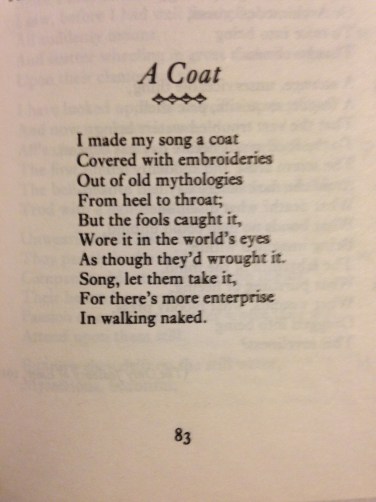If you leaf through a copy of Best New Poets 2008 you’ll find Alexandra Teague’s “Adjectives of Order,” which was originally published on Slate. As you might guess by the title, this is a poem that self-consciously flirts with the vagaries of English grammar. Having worked with ESL students and myself having once laid claim to the grim khanate of the grammar nerd, I was instinctively poised against this poem from the outset. It’s not fair and it’s not right, but my judgment begins at the title, and this one was struck me as too clever by half.
As an aside, I know this isn’t conducive to the best reception of a poem. When I go to readings, I always have a beer or two beforehand or a coffee while I’m there in order to lower my barriers. So if you’re trying to get a friend interested in poetry, you might try the minor pharmacopoeia to coax them along:
“Adjectives of Order”
By Alexandra Teague
That summer, she had a student who was obsessed
with the order of adjectives. A soldier in the South
Vietnamese army, he had been taken prisoner when
Saigon fell. He wanted to know why the order
could not be altered. The sweltering city streets shook
with rockets and helicopters. The city sweltering
streets.On the dusty brown field of the chalkboard,
she wrote: The mothertook warm homemade bread
from the oven. City is essential to streets as homemade
is essential to bread. He copied this down, but
he wanted to know if his brothers were lost before
older, if he worked security at a twenty-story modern
downtown bank or downtown twenty-story modern.
When he first arrived, he did not know enough English
to order a sandwich. He asked her to explain each part
of Lovelybig rectangular old red English Catholic
leather Bible. Evaluation before size. Age before color.
Nationality before religion. Time before length. Adding
and, one could determine if two adjectives were equal.
After Saigon fell, he had survived nine long years
of torture. Nine and long. He knew no other way to say this.
Back to Teague’s poem. Turns out, I fell head over heels for it. The narrative structure, though looping in time, is simple to interpret. This frees you to consider the rules governing the order of adjectives and map them onto the narrative. Like a clockwork, the simplicity of the face belies the complexity of the mechanism. And because the poem is compact, you can easily recenter on moments that may have initially escaped notice. “He wanted to know why the order / could not be altered,” once glossed, now blossoms.
The observations about the order of adjectives are alternately curious and profound. “Evaluation before size”; “nationality before religion.” And because the observations map so organically back onto the narrative, they never risk turning coy or pedantic. In a poem that rides on a conceit of grammar, that’s no small exploit.
The last line (“Nine and long. He knew no other way to say this.”) of course calls to mind Forché’s “The Colonel,” but Teague’s narrative inverts the roles so that the “subject” of the poem is a victim and the poet is the one doing the instructing. Yet in a strange way, the reader is left in the same position at the end of both poems, which is why I like to teach these two poems in concert.
Andrew Purcell
4/14/2016
P.S.
Alexandra Teague is the author of Mortal Geography and The Wise And Foolish Builders.
Andrew Purcell’s poetry and reviews have appeared in various publications across the country such as The Adirondack Review, The Baltimore Review, Forge, The Freshwater Review, The Los Angeles Review, Weave Magazine, and others.


